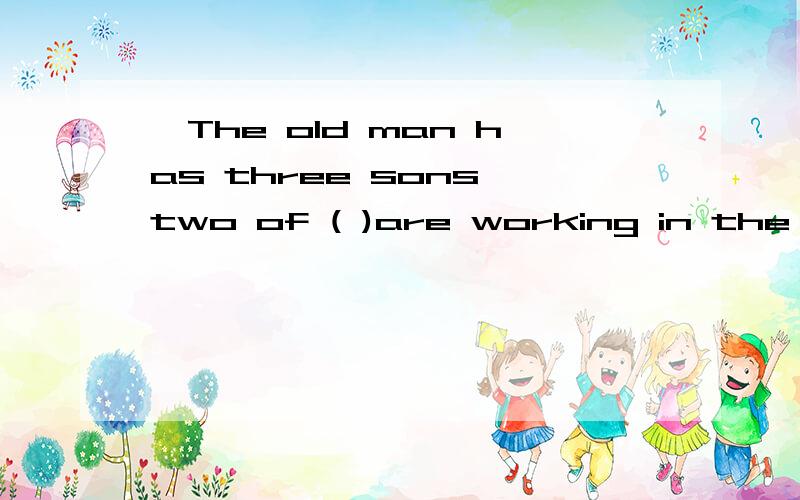,The old man has three sons,two of ( )are working in the hospital.йҖүWHOM,жҳҜ д»»дҪ•д»ӢиҜҚеҗҺйқўйғҪйҖүwhomдёҚз®ЎжҳҜеҒҡдё»иҜӯиҝҳжҳҜе®ҫиҜӯ,еҸӘиҰҒжҳҜд»ӢиҜҚеҗҺе°ұйҖүwhomд№Ҳ.
жқҘжәҗпјҡеӯҰз”ҹдҪңдёҡеё®еҠ©зҪ‘ зј–иҫ‘пјҡдҪңдёҡеё® ж—¶й—ҙпјҡ2024/07/11 22:24:48

,The old man has three sons,two of ( )are working in the hospital.йҖүWHOM,жҳҜ д»»дҪ•д»ӢиҜҚеҗҺйқўйғҪйҖүwhomдёҚз®ЎжҳҜеҒҡдё»иҜӯиҝҳжҳҜе®ҫиҜӯ,еҸӘиҰҒжҳҜд»ӢиҜҚеҗҺе°ұйҖүwhomд№Ҳ.
,The old man has three sons,two of ( )are working in the hospital.йҖүWHOM,жҳҜ д»»дҪ•д»ӢиҜҚеҗҺйқўйғҪйҖүwhom
дёҚз®ЎжҳҜеҒҡдё»иҜӯиҝҳжҳҜе®ҫиҜӯ,еҸӘиҰҒжҳҜд»ӢиҜҚеҗҺе°ұйҖүwhomд№Ҳ.
,The old man has three sons,two of ( )are working in the hospital.йҖүWHOM,жҳҜ д»»дҪ•д»ӢиҜҚеҗҺйқўйғҪйҖүwhomдёҚз®ЎжҳҜеҒҡдё»иҜӯиҝҳжҳҜе®ҫиҜӯ,еҸӘиҰҒжҳҜд»ӢиҜҚеҗҺе°ұйҖүwhomд№Ҳ.
д»ӢиҜҚеҗҺйқўзҡ„дёҖиҲ¬йғҪи·ҹwhomзҡ„
еёҢжңӣеӣһзӯ”еҜ№жӮЁжңүжүҖеё®еҠ©,иҜ·еҸҠж—¶йҮҮзәі,еӨҡи°ў!
д»ӢиҜҚеҗҺиӮҜе®ҡжҳҜеҒҡд»ӢиҜҚзҡ„е®ҫиҜӯ
д»ҺеҸҘйғЁеҲҶзҡ„дё»иҜӯжҳҜtwo иҖҢдёҚжҳҜиҝҷдёӘз©әпјҲwhomпјү AofB зҝ»иҜ‘дёәвҖңBзҡ„AвҖқ AжүҚжҳҜдёӯеҝғиҜҚ
дё»иҜӯеүҚдёҚдјҡжңүд»ӢиҜҚпјҢwhomеҸӘеҒҡе®ҫиҜӯпјҢеңЁд»ӢиҜҚеҗҺжҳҜд»ӢиҜҚзҡ„е®ҫиҜӯгҖӮ
д»ӢиҜҚеҗҺйқўйғҪйҖүwhomиҝҷз§ҚиҜҙжі•жҜ”иҫғзүҮйқў...е…¶е®һдҪ жҠҠд»ҺеҸҘеҲҶжҲҗдёӨеҸҘе°ұжҳҜдәҶ:
1. The old man has three sons.
2. Two of them are working in the hospital.
第дәҢеҸҘд»ҺеҸҘйҮҢз”Ёзҡ„жҳҜthem,жүҖд»Ҙе‘ў,е°ұз”ЁwhomдәҶ....